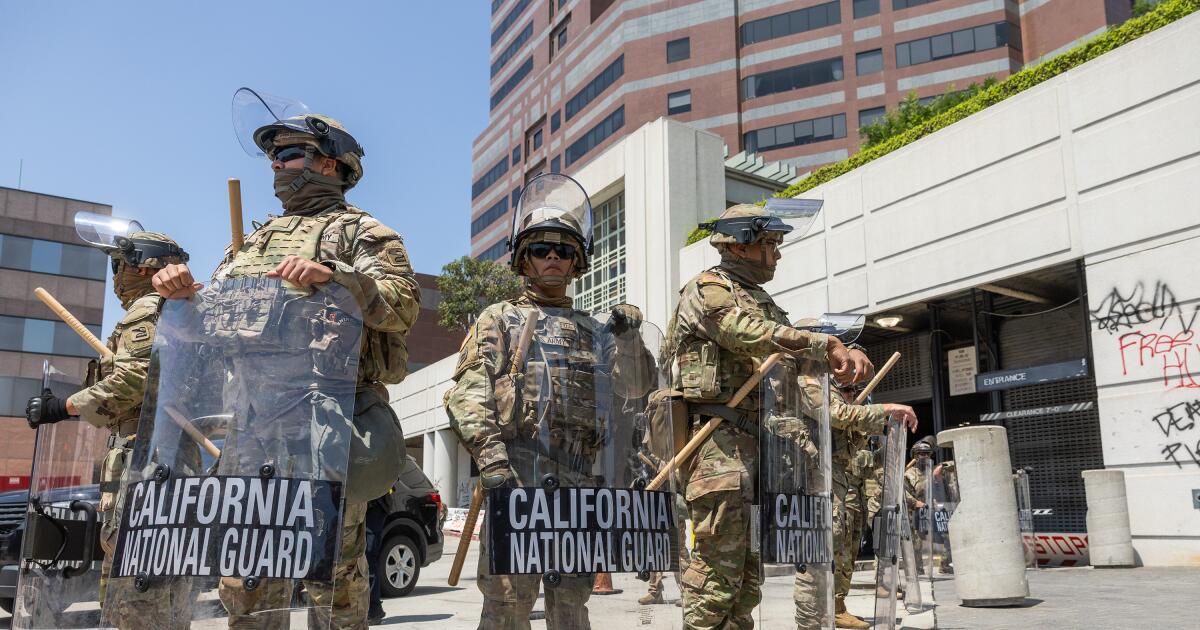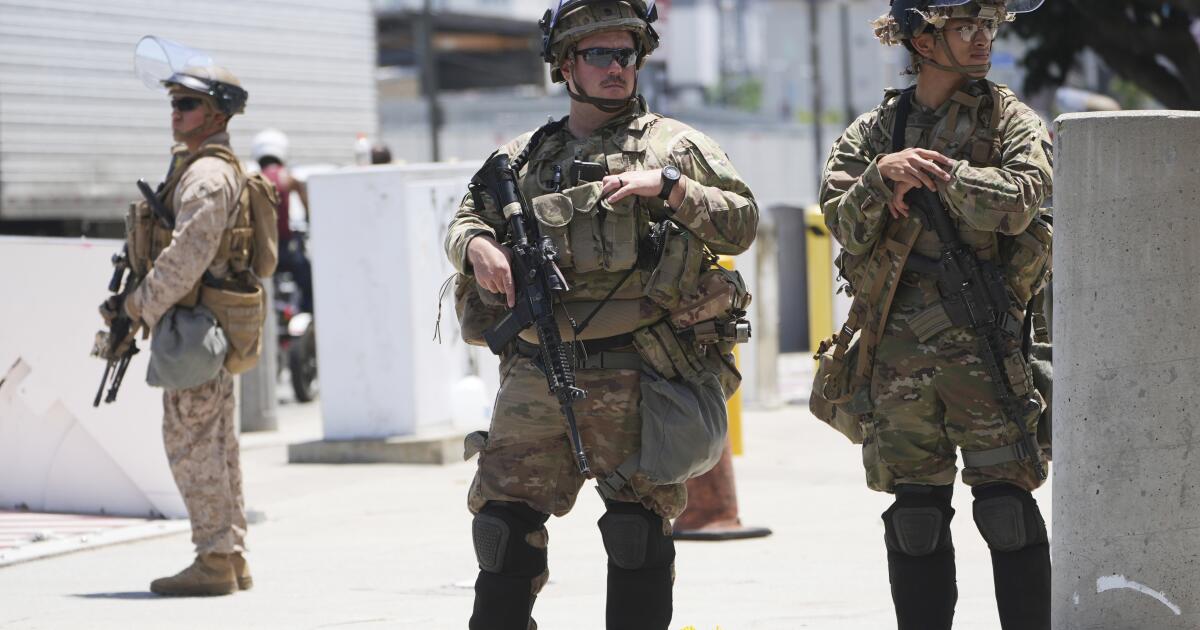Ruling on National Guard in L.A. won’t protect us from a ‘national police force’
A federal judge ruled Tuesday that President Trump’s deployment of the National Guard in Los Angeles was illegal, which the sane and democracy-loving among us should applaud — though of course an appeal is coming.
During the trial, though, a concerning but little-noticed exchange popped up between lawyers for the state of California and Maj. Gen. Scott Sherman, who was in charge of the federalized National Guard forces in L.A. It should have been an explosive, red-flag moment highlighting the pressure our military leaders are under to shake off their oath to the Constitution in favor of fealty to Trump.
Sherman testified that he objected to National Guard involvement in a show-of-force operation in MacArthur Park, where Latino families often congregate.
That action, Sherman said, was originally slated for Father’s Day, an especially busy time at the park. Internal documents showed it was considered it a “high-risk” operation. Sherman said he feared his troops would be pushed into confrontations with civilians if Border Patrol became overwhelmed by the crowds on that June Sunday.
Gregory Bovino, in charge of the immigration efforts in L.A. for the Border Patrol, questioned Sherman’s “loyalty to the country,” Sherman testified, for just showing hesitation about the wisdom and legality of an order.
It’s the pressure that “you’re not being patriotic if you don’t blow by the law and violate it and just bend the knee and and exhibit complete fealty and loyalty to Trump,” California Atty. Gen. Rob Bonta said Tuesday. And it’s a warning of what’s to come as Trump continues to press for military involvement in civilian law enforcement across the country.
For the record, Sherman has served our country for decades, earning along the way the prestigious Legion of Merit, the Bronze Star and the Meritorious Service Medal among other accolades.
The MacArthur Park operation, according to the Department of Homeland Security, was itself little more than a performative display of power “to demonstrate, through a show of presence, the capacity and freedom of maneuver of federal law enforcement within the Los Angeles,” according to agency documents presented in court. It was dubbed Operation Excalibur, in honor of the legendary sword of King Arthur that granted him divine right to rule, a point also included in court documents.
But none of that mattered. Instead, Sherman was pushed to exhibit the kind of blind loyalty to a dear leader that you’d expect to be demanded in dictatorships like those of North Korea or Hungary. Loyalty that confuses — or transforms — a duty to the Constitution with allegiance to Trump. Military experts warn that Sherman’s experience isn’t an isolated incident.
“There’s a chilling effect against pushing back or at least openly questioning any kind of orders,” Rachel E. VanLandingham, a retired Air Force lieutenant colonel, told me. She’s former active duty judge advocate in the U.S. Air Force who now teaches at Southwestern Law School and serves as a national security law expert.
VanLandingham sees the leadership of our armed forces under pressure “to not engage in the critical thinking, which, as commanders, they are required to do, and to instead go along to get along.” She sees Sherman’s testimony as a “telling glimpse into the wearing away” of that crucial independence.
Such a shift in allegiance would undermine any court order keeping the military out of civilian law enforcement, leaving Trump with exactly the boots on the ground power he has sought since his first term. This is not theoretical.
Through Secretary of Defense Pete Hegseth, Trump has purged the top ranks of the military of those who aren’t loyal to him. In February, Hegseth fired the chairman of the Joint Chiefs of Staff, a Black soldier who championed diversity in the armed forces. Hegseth has also purged the head of the Pentagon’s intelligence agency, the head of the National Security Agency, the chief of Naval Operations, multiple senior female military staff and senior military lawyers for the Army, Navy and Air Force. In August, he fired the head of the U.S. Defense Intelligence Agency after that general gave a truthful assessment of our bombing of Iran’s nuclear sites, angering Trump.
At the same time, the military is being pushed farther into civilian affairs, and not just as erstwhile cops. The Associated Press reported Tuesday that Hegseth ordered 600 military lawyers to serve as temporary immigration judges.
Not to dive too deep into the convoluted immigration system, but these are civilian legal positions, another possible violation of the Posse Comitatus Act, VanLandingham points out.
And beyond that, can a military lawyer — trained and bound to follow orders — really act as an impartial judge in proceedings where the administration’s wish to deport is clearly known?
Goodbye due process, goodbye fair trial.
That “looks like martial law when you have militarized … judicial proceedings,” VanLandingham said. “How can we trust they are making unbiased decisions? You can’t.”
And even though Sherman pushed back on a full-blown military presence in MacArthur Park, that raid did happen. Federal agents marched through, about three weeks after Father’s Day, with National Guard troops remaining in their vehicles on the perimeter. It was Hegseth himself who authorized the mission.
Sherman also said on the stand that he was told there were “exceptions” to the Posse Comitatus Act — the law being debated in the trial that prevents the military from being used as civilian law enforcement — and that the president had the power to decide what those exceptions were.
“So your understanding is that while [some actions] are on the list of prohibited functions, you can do them under some circumstances?” Judge Charles Breyer asked.
“That’s the legal advice I received,” Sherman answered.
“And the president has the authority to make that decision?” Breyer asked.
“The president has the authority,” Sherman answered.
But does he?
Breyer also asked during the trial, if the president’s powers to both command troops and interpret law are so boundless, “What’s to prevent a national police force?” What, in effect, could stop Trump’s Excalibur-inspired inclinations?
For now, it’s the courts and ethical, mid-level commanders like Sherman, whose common-sense bravery and decency kept the military out of MacArthur Park.
Men and women who understand that the oaths they have sworn are to our country, not the man who would be king.

